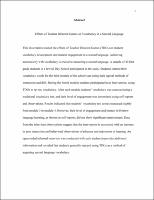Please use this identifier to cite or link to this item:
https://hdl.handle.net/20.500.12202/8685Full metadata record
| DC Field | Value | Language |
|---|---|---|
| dc.contributor.advisor | Krakowski, Moshe | |
| dc.contributor.advisor | Novick, Rona | |
| dc.contributor.advisor | Goldberg, Scott J. | |
| dc.contributor.author | Babad, Rivka | |
| dc.date.accessioned | 2023-01-26T23:09:32Z | |
| dc.date.available | 2023-01-26T23:09:32Z | |
| dc.date.issued | 2022-12 | |
| dc.identifier.citation | Babad, R. (2022, December). Effects of teacher directed games on vocabulary in a second language (Publication No. 30248294) [Doctoral dissertation, Yeshiva University]. PDTG | en_US |
| dc.identifier.isbn | 9798368475677 | |
| dc.identifier.uri | https://hdl.handle.net/20.500.12202/8685 | |
| dc.identifier.uri | https://ezproxy.yu.edu/login?url=https://www.proquest.com/dissertations-theses/effects-teacher-directed-games-on-vocabulary/docview/2774591433/se-2?accountid=15178 | |
| dc.description | Doctoral dissertation, EdD / Open Access | en_US |
| dc.description.abstract | This dissertation studied the effects of Teacher Directed Games (TDGs) on student vocabulary development and student engagement in a second language. Achieving automaticity with vocabulary is crucial to mastering a second language. A sample of 40 first grade students in a Jewish Day School participated in the study. Students learned their vocabulary words for the third module of the school year using their typical methods of instruction and drill. During the fourth module students participated in an intervention, using TDGs to review vocabulary. After each module students’ vocabulary was assessed using a traditional vocabulary test, and their level of engagement was determined using self-reports and observations. Results indicated that students’ vocabulary test scores increased slightly from module 3 to module 4. However, their level of engagement and interest in Hebrew language learning, as shown on self-reports, did not show significant improvement. Data from the behavioral observations suggest that the intervention is associated with an increase in peer interaction and behavioral observations of pleasure and enjoyment in learning. An open-ended informal interview was conducted with each student to provide additional information and revealed that students generally enjoyed using TDGs as a method of acquiring second language vocabulary. | en_US |
| dc.language.iso | en_US | en_US |
| dc.publisher | Yeshiva University | en_US |
| dc.relation.ispartofseries | Azrieli Doctoral Dissertations;Publication No. 30248294 | |
| dc.rights | Attribution-NonCommercial-NoDerivs 3.0 United States | * |
| dc.rights.uri | http://creativecommons.org/licenses/by-nc-nd/3.0/us/ | * |
| dc.subject | Elementary language | en_US |
| dc.subject | Education | en_US |
| dc.subject | games | en_US |
| dc.subject | Hebrew vocabulary | en_US |
| dc.subject | Primary grades | en_US |
| dc.title | Effects of teacher directed games on vocabulary in a second language | en_US |
| dc.type | Dissertation | en_US |
| Appears in Collections: | Azrieli Graduate School of Jewish Education & Administration: Doctoral Dissertations | |
Files in This Item:
| File | Description | Size | Format | |
|---|---|---|---|---|
| Rivka Babad Effects of Dec2022 OA 1-25-23.pdf | 2.28 MB | Adobe PDF |  View/Open |
This item is licensed under a Creative Commons License

